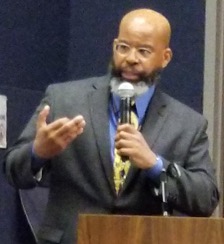School of Community Health and Policy

Omowali Makari
Office: Portage Room 207
Phone: 443-885-4518
omowali.makari@morgan.edu
As a “dyed-in-the-wool” Environmental Scientist, my primary areas of research interest are: urban soil pollution and remediation, byproduct utilization, urban water quality, constructed wetlands, and the impact of environmental contaminates on public health. My dissertation research focused on the use of low cost, environmentally “safe” industrial, municipal, and agricultural byproducts to remediate lead (Pb) in highly contaminated urban soils. I have conducted and participated in research at various national laboratories, e.g., Oak Ridge National Laboratory, Savanna River Ecology Laboratory, as well as the U. S. Department of Agriculture, Beltsville Agricultural Research Center. My goals are to continue research and teach in the above listed areas and, due to their woeful underrepresentation in the discipline, to work at inspiring young African and diaspora African students to pursue careers in the environmental sciences.
My Teaching and Research Philosophy
My personal teaching philosophy is based on four core pedagogical concepts. First, I recognize and appreciate that students have different levels of preparation and rigor of the sciences in their various academic backgrounds, and I must have the willingness to respond effectively to that reality. Second, I must continually develop and maintain a personal willingness and commitment to positively engage and encourage students to exert themselves to acquire the requisite knowledge, habits, and skills needed in the attainment of a quality science education. Next, as an academician and scientist, I must be, and I am, committed to the unrelenting pursuit of truth, to understand nature as it exists beyond my subjective comprehension. Finally, I am and must be committed to the uncompromising maintenance of a high quality of instruction and maintain high expectations of my students in the development of their critical thinking skills as eventual informed, college graduates.
My research philosophy is very simple: Interests: The only way that we can hope for a sustainable future on this planet is that we must engage in the unending search to understand how nature works, how the ecosystems of this planet affects us and how we affect it, and use that understanding to develop better techniques and technologies that enable us to work with nature so as not to despoil the very systems we completely dependent upon for our continued existence. This philosophical orientation has led me to two board areas of research interest: Urban soil contamination remediation and constructed wetland biochemistry. My interest in soil contamination remediation is based on the idea of finding ways to use different “waste” by-products and turned them into resources that can help remediate urban soil pollution problems that continue to negatively impact the health of city dwellers. My interest in constructed wetland biogeochemistry is based on the idea of finding different ways to design and build artificial wetlands that clean different types of contaminated water cheaply and sustainability.
Contact Information
School of Community Health & Policy
Dr. Kim Dobson Sydnor, Dean
4530 Portage Avenue Campus
1700 E. Cold Spring Lane, Suite 223
Baltimore, MD 21251
P: 443-885-3238
F: 443-885-8309
Comments or Suggestions
Comments or suggestions, please submit them to: Beverly.Inman@morgan.edu
Contact Information
School of Community Health & Policy
Dr. Kim Dobson Sydnor, Dean
4530 Portage Avenue Campus
1700 E. Cold Spring Lane, Suite 223
Baltimore, MD 21251
P: 443-885-3238
F: 443-885-8309
Comments or Suggestions
Comments or suggestions, please submit them to: Beverly.Inman@morgan.edu

